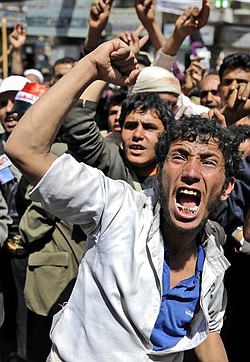Yemen leader loses support
AP
An anti-government protestor shouts slogans during a demonstration demanding the resignation of Yemeni President Ali Abdullah Saleh, in Sanaa,Yemen, Monday, March 21, 2011. Three Yemeni army commanders, including a top general, defected Monday to the opposition calling for an end to President Ali Abdullah Saleh's rule, as army tanks and armored vehicles deployed in support of thousands protesting in the capital. With the defection, it appeared Saleh's support was eroding from every power base in the nation - his own tribe called on him to step down, he fired his entire Cabinet ahead of what one government official said was a planned mass resignation, and his ambassador to the U.N. and human rights minister quit.
Associated Press
SAN‘A, Yemen
A top military commander and at least 18 other senior officers defected Monday to the opposition movement demanding the ouster of Yemen’s embattled president, depriving the U.S.-allied ruler of most of his power base.
The looming collapse of President Ali Abdullah Saleh’s regime throws into doubt the American campaign against a major al-Qaida wing that plotted attacks in the United States.
Monday’s defections led to rival tanks’ being deployed in the streets of Yemen’s capital, San‘a, creating a potentially explosive situation and prompting Saleh’s defense minister, Mohammed Nasser Ahmed, to announce the military remained loyal to the longtime leader.
The armed forces will counter any plots against the government, Ahmed declared on state television after a meeting of the National Defense Council, which is led by Saleh and includes Ahmed, the prime minister and the intelligence chief.
The defection of Maj. Gen. Ali Mohsen al-Ahmar, a longtime Saleh confidante and commander of the army’s powerful 1st Armored Division, was seen by many as a turning point. It followed a major escalation in the regime’s crackdown on demonstrators, when more than 40 people were killed in bloody clashes Friday.
Speaking in Paris, French Foreign Minister Alain Juppe called Saleh’s resignation “unavoidable” and pledged “support to all those that fight for democracy.”
Tanks, armored vehicles and soldiers directed by al-Ahmar fanned out around the San‘a square that has become the epicenter of the opposition movement, moving in for the first time to protect demonstrators.
Al-Ahmar also sent tanks to the state television building, the Central Bank and the Defense Ministry. Just miles away, at least a dozen tanks and armored personnel carriers belonging to the Republican Guards, an elite force led by Saleh’s son and one-time heir apparent, Ahmed, were deployed outside the presidential palace.
The deployment of al-Ahmar’s troops in San‘a was greeted by wild jubilation from protesters, many of whom posed with soldiers for photographs, greeted them with military style salutes or offered them roses.
Calling Al-Ahmar’s defection “a turning point,” Edmund J. Hull, U.S. ambassador to Yemen from 2001 to 2004, said it showed “the military overall ... no longer ties its fate to that of the president.”
 43
43

